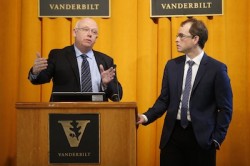Though still unconvinced of the overall merits of the Affordable Care Act, registered voters in Tennessee continue to say they favor accepting federal dollars to expand the state Medicaid program.
Fifty-six percent of those asked by the Vanderbilt Poll Nov.10-20 said they strongly or somewhat support expanding Medicaid to provide medical care for people living on low incomes. This support is not new, since a majority of the public was also supportive of Medicaid expansion a year ago in the December 2013 Vanderbilt poll.

Gov. Bill Haslam has been negotiating with federal officials about expanding Medicaid, despite resistance from Republicans in the state legislature who have stated they will not support any such plan. Legislation was enacted this year requiring the governor to get approval from the General Assembly on any Medicaid expansion plan.
The ACA itself continues to be unpopular among Tennessee voters, but nearly one-third of registered voters remain unconvinced one way or the other. Forty-four percent of registered voters say they generally feel unfavorable to it. Twenty percent felt generally favorable toward it, but 35 percent said they haven’t heard enough about it to form an opinion.
The Vanderbilt Poll is conducted just prior and then after each session of the Tennessee General Assembly, in order to gauge how closely the concerns of citizens align with their representatives in Nashville. The November 2014 poll surveyed 949 registered voters.
Popular governor
Haslam, recently elected to succeed New Jersey Gov. Chris Christie as chairman of the Republican Governor’s Association, maintains his commanding popularity in his home state, with 70 percent of those polled approving of his job performance. That’s the highest approval rating Haslam has earned since December 2012, when he was at 68 percent.
John Geer, co-director of the Vanderbilt Poll and Gertrude Conaway Vanderbilt Professor of Political Science, contends “that we rarely see such high numbers. [rquote]It speaks volumes about the governor’s success during his first term in office[/rquote].”
Abortion
Last month’s 51 to 47 percent passage of Amendment 1 gave the General Assembly the power to enact, amend or repeal state statutes regarding abortion in Tennessee. Tennessee voters told the Vanderbilt Poll they had strong opinions about the kind of abortion legislation they would support.
A majority, 67 percent, said they oppose any ban that would outlaw abortion without exception. Fifty-five percent, however, indicated support for a two-day waiting period after an in-person consultation while 30 percent opposed such a waiting period. Forty-seven percent would approve requiring women to undergo an ultrasound before having an abortion (34 percent opposed), but only 25 percent favored a law that would prohibit private health insurance plans from covering abortion costs.
Generation gap
There are several policies where a generation gap is increasingly evident in Tennessee based on the latest Vanderbilt Poll results. Support for the legalization of marijuana and legal recognition for same-sex couples depend critically on the generation of the respondent, as do beliefs about the consequences of income equality.
Among those polled, nearly 70 percent approved of some form of legalization – 42 percent approved of the use of marijuana for strictly medicinal purposes, but 29 percent would favor legalization for personal use. Fully half of those between 18-24 believe it should be legalized for personal use, compared to only 12 percent of those 64 and older.
Support for same-sex marriage in the current Vanderbilt Poll has held steady at 32 percent and support for civil unions has increased to 25 percent from 17 percent in May 2013. But among those over 64 years old, only 40 percent support recognition of same-sex couples. By contrast, 70 percent of those under 45 indicate their support.
“[rquote]Baby boomers and the silent generation are far more likely to oppose marijuana legalization and the legal recognition of same-sex couples than millennials or Gen Xers[/rquote],” said Josh Clinton, co-director of the Vanderbilt Poll and professor of political science. “This generational divide in opinion highlights the impact of low voter turnout by younger voters on policy outcomes. Elected officials rarely listen to voters who fail to vote.”
Views on income inequality are nearly evenly split among Tennessee voters. Forty-nine percent believe that anyone of any background can succeed financially by working hard, while 47 percent believe the widening gap between the wealthy and everyone else is undermining that ideal.
“There is a clear generational split in this belief,” Clinton said. “Members of the millennial and Generation X are most likely to think that the income gap undermines success, but the baby boomer and silent generation are most likely to think that anyone can succeed.”
Board of advisers
To help identify the most important issues facing the state and to ensure that questions avoid ideological and partisan bias, a bi-partisan board of advisers provides guidance on each Vanderbilt Poll.
Current board members are:
- Charles W. Bone, attorney and chairman of Bone McAllester Norton PLLC
- Tom Ingram, political strategist with The Ingram Group
- Roy M. Neel, former chief of staff to Vice President Al Gore
- Bill Phillips, government relations consultant and former Nashville deputy mayor
- Bill Purcell, former Nashville mayor and counsel at Jones Hawkins & Farmer PLC
- Anne Russell, special counsel at Adams and Reese LLP
- Chip Saltsman, former chief of staff for Rep. Chuck Fleischmann and political strategist
The Vanderbilt Poll, conducted by Princeton Survey Research Associates International, has a margin of error of plus or minus 3.7 percentage points. More information is available at the website of the Center for the Study of Democratic Institutions.